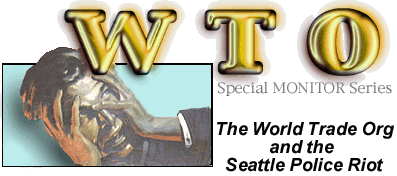
Where's the Media Coverage of These Crucial Issues?
by Peter Phillips
 |
by Peter Phillips |
|
For
three years, representatives of the world's twenty-nine richest
nations met secretly in France working towards an international agreement
on investment policies. Known as the Multilateral Agreement on Investment (MAI), it would have set in place a vast series of protections for foreign
investment. It would have thrust the world economy much closer to a system
where international corporate capital would hold free reign over the
democratic values and socioeconomic needs of people. The MAI would have had
devastating effects on a nation's legal, environmental, and cultural
sovereignty. It would have forced countries to relax or nullify human,
environmental and labor protections to attract investment and trade.
Necessary measures such as food subsidies, control of land speculation,
agrarian reform and health and environmental standards could have been
challenged as "illegal" under the MAI.
The MAI talks in France broke up at the end of 1998 due to extensive objections from Canadian and European labor unions, environmental groups, consumer unions, and cultural organizations. The pros and cons of MAI were widely covered in the European and Canadian press. Canadian Public Broadcasting ran three national programs on MAI. Yet in the U.S. media scarcely a word on MAI was heard during that period. The few minor articles in the business sections and pack pages of the American papers failed to bring MAI to public consciousness, nor cover the negative aspects of the proposed treaty. Trade agreements are fast becoming the globalization instruments of the "New World Order." Multinational corporations, are seeking a free economic reign in the world regardless of negative impacts on human populations and the environment. 500,000 U.S. jobs have been lost to NAFTA. World Trade Organizations rulings in 1997 and 1998 weakened U.S. federal air quality standards and undermined our Endangered Species Act. Trade laws threaten negative effects on every family in the U.S. Agenda setting for a new round of trade discussions is scheduled through the World Trade Organization (WTO) in Seattle for November 30 to December 3. At stake is the establishment of the content of future trade talks for the next five years. Tens of thousands of union, environmental, and social justice activists are planning to assembly in opposition to the WTO meetings. Back on the agenda is MAI. Additionally, multinational corporations want to form global agreements on competition, whereby developing countries would be forbidden to give special support to domestic businesses, but instead be required to throw open their doors so their internal companies would have to compete openly with the huge multinationals. Where is the U.S. media on these issues? Why haven't the pros and cons of the proposed WTO agenda been reviewed on the front pages of every newspaper in the U.S? As the Seattle area gears up for some 5,000 WTO delegates and perhaps ten times as many activists, local media has had fairly extensive coverage on the upcoming events, but little on the issues. However, media throughout the rest of the U.S. has almost completely failed to cover the issues on this globally important event. Millions of American will be impacted by the agenda set late this Fall. We deserve to read and hear about the consequences of global trade agreements in our morning newspapers, and on radio and television nationwide. We cannot maintain a democratic process if the people are unaware of the issues.
Albion Monitor
November 28, 1999 (http://www.monitor.net/monitor) All Rights Reserved. Contact rights@monitor.net for permission to use in any format. |